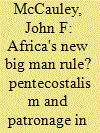|
|
|
Sort Order |
|
|
|
Items / Page
|
|
|
|
|
|
|
| Srl | Item |
| 1 |
ID:
118961


|
|
|
|
|
| Publication |
2013.
|
| Summary/Abstract |
The concept of 'big man rule', conventionally invoked to refer to a kinship-based relationship between patron and client, is now finding application in the charismatic Pentecostal movement in Africa. This article explores why new Pentecostalism emerges as an alternative to traditional clientelism, and how well the analogy of big man rule applies. It traces the Pentecostal form of big man rule to four socio-economic transformations: ongoing weakness in the state's ability to provide social welfare; a change in social values in the wake of the global financial crisis; expanding state control over customary activities; and urbanization. Drawing on data collected from both patrons and clients in Ghana, the article shows that Pentecostalism mirrors traditional big man rule by encouraging members to break from their past, to trust leadership, and to commit exclusively to their religious social network. Among church leaders, Pentecostalism also encourages internal competition and the provision of social services. Most importantly, the movement creates pay-off structures that replicate the exchange of resources for loyalty central to big man rule. The implication is that Pentecostalism's success as an alternative informal institution is not a function of Weberian ethics or occult spiritualities, but rather its ability to fill voids left by the state and to provide new social networks.
|
|
|
|
|
|
|
|
|
|
|
|
|
|
|
|
| 2 |
ID:
135958


|
|
|
|
|
| Summary/Abstract |
When elites mobilize supporters according to different cleavages, or when individuals realign themselves along new identity lines, do their political preferences change? Scholars have focused predominantly on the size of potential coalitions that leaders construct, to the exclusion of other changes that might occur when one or another identity type is made salient. In this article, I argue that changes in the salience of ethnicity and religion in Africa are associated with variation in policy preferences at the individual level. I test this claim empirically using data from a framing experiment in Côte d’Ivoire and Ghana. By randomly assigning participants to either a religious or an ethno-linguistic context, I show that group members primed to ethnicity prioritize club goods, the access to which is a function of where they live. Otherwise identical individuals primed to religion prioritize behavioral policies and moral probity. These findings are explained by the geographic boundedness of ethnic groups and the geographic expansiveness of (world) religions in the study area.
|
|
|
|
|
|
|
|
|
|
|
|
|
|
|
|
| 3 |
ID:
191048


|
|
|
|
|
| Summary/Abstract |
Researchers have commonly treated misrepresentations in survey responses as an impediment to the accurate measurement of a variable or construct of substantive importance. This study builds on that approach and considers whether misreporting bias regarding support for violent extremism—both under- and over-reporting—may then have consequences for how terrorist violence itself unfolds. Using data from nearly 4,000 respondents in thirty-five communes in Burkina Faso, Chad, and Niger collected just prior to a recent wave of terrorist attacks, we find that communes where individuals under-report their true support for violent extremism—as measured with unobtrusive experimental methods—have a greater probability of experiencing subsequent Islamist attacks, controlling for socio-demographic characteristics of the commune, country-level proximity effects, and other time-varying factors. The findings raise important considerations regarding the measurement of extremist support, and they suggest a new tool for identifying communities potentially susceptible to terrorist violence.
|
|
|
|
|
|
|
|
|
|
|
|
|
|
|
|
|
|
|
|
|